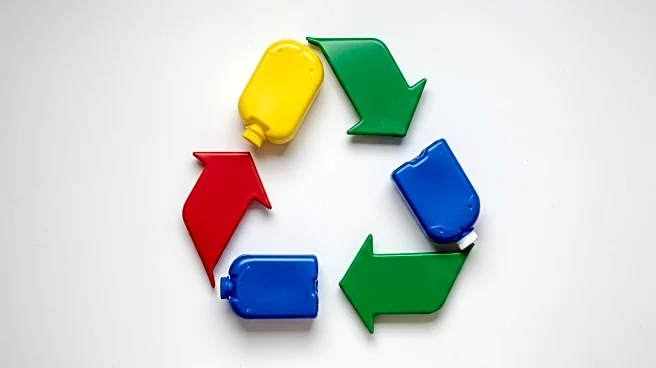What's Happening?
Recent negotiations in Geneva aimed at establishing a global treaty to reduce plastic pollution ended without agreement. Despite the efforts of around 100 countries advocating for production caps, major oil-producing nations like Saudi Arabia and the United States opposed these measures, citing economic concerns. The failure to reach a consensus means that efforts to combat plastic pollution will continue to rely on recycling, reuse, and product design improvements. The Organisation for Economic Co-operation and Development (OECD) estimates that plastic production could increase by 70% by 2040 without significant changes. Currently, only 6% of plastics are recycled due to the complexity of recycling different types of plastics.
Why It's Important?
The inability to agree on production caps for plastics highlights the ongoing challenge of balancing environmental concerns with economic interests. Plastics contribute significantly to greenhouse gas emissions, accounting for 3.4% of global emissions in 2019. The reliance on recycling and reuse as primary solutions underscores the need for innovation in these areas. However, the effectiveness of recycling is limited by the diverse chemical compositions of plastics, making it costly and inefficient. The situation calls for a reevaluation of strategies to reduce plastic production and waste, which could have significant implications for environmental policy and industry practices.
What's Next?
With the treaty talks stalled, the focus will likely shift to enhancing recycling infrastructure and consumer education on recycling practices. Innovations in material science may help incorporate more recycled plastics into products, but significant challenges remain. Cities may need to invest in costly infrastructure improvements to support recycling efforts, and there is a need for a market for recycled materials. The ongoing legal actions, such as California's lawsuit against Exxon Mobil, may also influence future policy and industry standards regarding plastic production and recycling.
Beyond the Headlines
The broader implications of the failed treaty talks include potential shifts in public policy and industry practices. The emphasis on recycling and reuse may drive innovation in sustainable materials and product design. Additionally, the legal and ethical dimensions of plastic production and recycling could become more prominent, influencing corporate accountability and consumer behavior. The situation may also prompt increased advocacy for environmental justice, particularly in communities affected by pollution from plastic production facilities.










